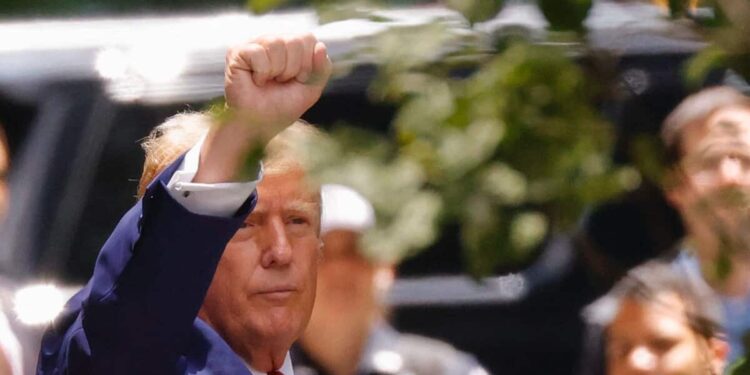Protected throughout the trial by their anonymity, the jurors who found Donald Trump “guilty” on Thursday hope to resume an (almost) normal life, although these 12 New Yorkers are now facing an unprecedented “danger” for their safety, experts say.
A sign of the extreme sensitivity of the question of jury security in the Manhattan court, Judge Juan Merchan ordered the accused Donald Trump never to attack these five women and seven men in his public remarks.
This decision is still effective and also applies to witnesses as well as the family of the judge — who has often been insulted by Donald Trump — and those of the prosecutors, at least until the sentencing on July 11 .
After jurors answered “yes guilty” to all 34 counts of accounting falsification, Judge Merchan thanked them for “giving this matter the attention it deserved.”
Confidentiality
But in a thinly veiled warning, he insisted on the confidentiality to which they were bound during the trial.
“You will remember (that at the start of the trial) I lectured you a bit. You are now free to discuss the case if you wish (…) It is a choice that is yours,” warned the magistrate, his voice a little trembling.
- Listen to the American political discussion with Stéphan Bureau on Alexandre Dubé’s microphone via QUB :
For Claire Finkelstein, professor of law at the University of Pennsylvania, the identity of each juror will eventually “come out and it will be through the defense” of Donald Trump.
Anonymous to the general public and the press, the 12 jurors were not anonymous to the defense and prosecution lawyers.
According to the organization Advance Democracy, cited Friday by NBC News television, violent remarks against Judge Merchan and the prosecutor who investigated the whole affair, Alvin Bragg, as well as their alleged addresses and those of jurors, were circulated on social media accounts of Trumpist supporters.
In an ultra-polarized America, five months before the presidential election between Joe Biden and Donald Trump, the jurors “are going to find themselves in danger (…) and that is a real cause for concern,” fears Ms. Finkelstein.
Breaking the anonymity
It has happened that after major high-profile trials, jurors have broken their anonymity to tell their story to the press or in a book.
As after the controversial acquittal in 1995 of former American football superstar OJ Simpson (died in April) for the murder of his ex-wife.
One juror published a book, another contributed to a television documentary.
In fact, once the case is concluded, “the jurors are free to discuss it, to talk about the evidence and the deliberations,” explains former prosecutor Bennett Gershman. But this law professor “does not see Trump’s jurors trying to make money from their experience.”
For former President Trump’s trial, a female juror selected from 200 people threw in the towel after revealing to the judge that her name had been in the press.
Moreover, during the five weeks of debate – where no cameras or sound recorders were allowed – Judge Merchan urged journalists never to give physical descriptions of the jurors.
Brad Hoylman-Sigal, chairman of the New York State Senate Judiciary Committee — Trump was tried by the local New York justice system — assured that the security of the jury was of “the utmost importance “.
If jurors are threatened, Professor Finkelstein advises, New York authorities “could provide them with home security, rehouse them and, if it becomes really dangerous, place them under a witness protection program.”
During the trial, Donald Trump was sometimes supported in the courtroom and outside by his family, Republican elected officials, and also, the former boxer, bodyguard and ex-leader of the Hell’s Angels group in New York, Chuck Zito.
The former president’s entourage “clearly tried to intimidate jurors before the verdict”, thinks Ms Finkelstein for whom the trial was “really similar to (that) of a member of the mafia”.



